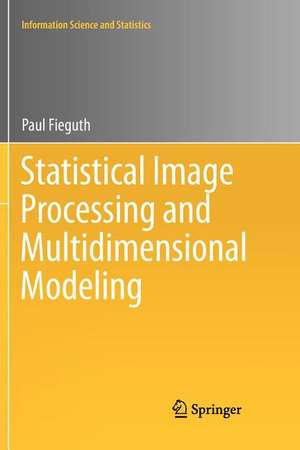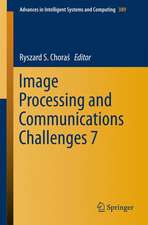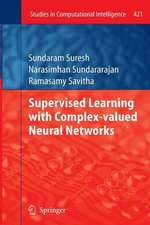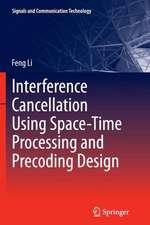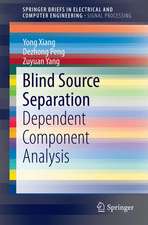Statistical Image Processing and Multidimensional Modeling: Information Science and Statistics
Autor Paul Fieguthen Limba Engleză Paperback – dec 2012
| Toate formatele și edițiile | Preț | Express |
|---|---|---|
| Paperback (1) | 953.03 lei 6-8 săpt. | |
| Springer – dec 2012 | 953.03 lei 6-8 săpt. | |
| Hardback (1) | 959.36 lei 6-8 săpt. | |
| Springer – 26 oct 2010 | 959.36 lei 6-8 săpt. |
Din seria Information Science and Statistics
- 24%
 Preț: 1151.30 lei
Preț: 1151.30 lei - 24%
 Preț: 1327.60 lei
Preț: 1327.60 lei - 20%
 Preț: 415.71 lei
Preț: 415.71 lei - 18%
 Preț: 1384.56 lei
Preț: 1384.56 lei - 18%
 Preț: 1114.83 lei
Preț: 1114.83 lei - 18%
 Preț: 1125.09 lei
Preț: 1125.09 lei - 15%
 Preț: 647.73 lei
Preț: 647.73 lei - 20%
 Preț: 1059.92 lei
Preț: 1059.92 lei - 20%
 Preț: 1050.02 lei
Preț: 1050.02 lei - 18%
 Preț: 956.03 lei
Preț: 956.03 lei - 20%
 Preț: 650.27 lei
Preț: 650.27 lei - 18%
 Preț: 897.65 lei
Preț: 897.65 lei - 15%
 Preț: 583.56 lei
Preț: 583.56 lei - 15%
 Preț: 591.79 lei
Preț: 591.79 lei -
 Preț: 386.61 lei
Preț: 386.61 lei - 20%
 Preț: 1284.14 lei
Preț: 1284.14 lei -
 Preț: 394.51 lei
Preț: 394.51 lei - 20%
 Preț: 989.31 lei
Preț: 989.31 lei - 20%
 Preț: 335.52 lei
Preț: 335.52 lei - 18%
 Preț: 891.02 lei
Preț: 891.02 lei
Preț: 953.03 lei
Preț vechi: 1162.23 lei
-18% Nou
Puncte Express: 1430
Preț estimativ în valută:
182.36€ • 190.91$ • 150.89£
182.36€ • 190.91$ • 150.89£
Carte tipărită la comandă
Livrare economică 05-19 aprilie
Preluare comenzi: 021 569.72.76
Specificații
ISBN-13: 9781461427056
ISBN-10: 1461427053
Pagini: 476
Ilustrații: XXII, 454 p.
Dimensiuni: 155 x 235 x 25 mm
Greutate: 0.66 kg
Ediția:2011
Editura: Springer
Colecția Springer
Seria Information Science and Statistics
Locul publicării:New York, NY, United States
ISBN-10: 1461427053
Pagini: 476
Ilustrații: XXII, 454 p.
Dimensiuni: 155 x 235 x 25 mm
Greutate: 0.66 kg
Ediția:2011
Editura: Springer
Colecția Springer
Seria Information Science and Statistics
Locul publicării:New York, NY, United States
Public țintă
ResearchCuprins
Introduction.- Inverse problems.- Static estimation and sampling.- Dynamic estimation and sampling.- multidimensional modelling.- Markov random fields.- Hidden markov models.- Changes of basis.- Linear systems estimation.- Kalman filtering and domain decomposition.- Sampling and monte carlo methods.
Recenzii
From the book reviews:
“The book refers to 350 of up-to-date sources and each chapter suggests sample problems and numerical exercises. … it is a great book going much beyond a graduate course textbook, so it can be incredibly valuable for researchers in image computer sciences and various data analysis fields.” (Stan Lipovetsky, Technometrics, Vol. 54 (4), November, 2012)
“In addition to providing a very readable, deep, technical introduction to the subject, Fieguth provides a lot of insight, helpful tips, and examples … . there is a useful discussion of how one may be able to model such that one ends up with sparse matrices, which are usually an ingredient of successful computing. … The reviewer strongly recommends the book to those who wish to do this kind of image analysis.” (Jayanta K. Ghosh, International Statistical Review, Vol. 80 (3), 2012)
“This text by Paul Fieguth is concerned with statistical image processing. … The scope of the book is wide, and it contains intriguing examples from many fields. … The book would be an excellent reference book for a statistician or engineer with interests in image processing. It would also make a fine text for a graduate class … . Overall this book is an excellent overview of the subject, successfully bridging the gap between the fields of statistics and engineering.” (Daniel Walsh, Australian & New Zealand Journal of Statistics, Vol. 53 (3), 2011)
“This monograph … can serve as good introductory text in multidimensional signal and image processing for researchers and engineers specialized in interdisciplinary areas varying from machine vision systems and geology to biomedical engineering applications. … this monograph can be used as textbook for graduate and postgraduate students who study multidimensional signal and image processing.” (Denis Sidorov, Zentralblatt MATH, Vol. 1209, 2011)
“The book refers to 350 of up-to-date sources and each chapter suggests sample problems and numerical exercises. … it is a great book going much beyond a graduate course textbook, so it can be incredibly valuable for researchers in image computer sciences and various data analysis fields.” (Stan Lipovetsky, Technometrics, Vol. 54 (4), November, 2012)
“In addition to providing a very readable, deep, technical introduction to the subject, Fieguth provides a lot of insight, helpful tips, and examples … . there is a useful discussion of how one may be able to model such that one ends up with sparse matrices, which are usually an ingredient of successful computing. … The reviewer strongly recommends the book to those who wish to do this kind of image analysis.” (Jayanta K. Ghosh, International Statistical Review, Vol. 80 (3), 2012)
“This text by Paul Fieguth is concerned with statistical image processing. … The scope of the book is wide, and it contains intriguing examples from many fields. … The book would be an excellent reference book for a statistician or engineer with interests in image processing. It would also make a fine text for a graduate class … . Overall this book is an excellent overview of the subject, successfully bridging the gap between the fields of statistics and engineering.” (Daniel Walsh, Australian & New Zealand Journal of Statistics, Vol. 53 (3), 2011)
“This monograph … can serve as good introductory text in multidimensional signal and image processing for researchers and engineers specialized in interdisciplinary areas varying from machine vision systems and geology to biomedical engineering applications. … this monograph can be used as textbook for graduate and postgraduate students who study multidimensional signal and image processing.” (Denis Sidorov, Zentralblatt MATH, Vol. 1209, 2011)
Notă biografică
Paul Fieguth is a professor in Systems Design Engineering at the University of Waterloo in Ontario, Canada. He has longstanding research interests in statistical signal and image processing, hierarchical algorithms, data fusion, and the interdisciplinary applications of such methods, particularly to problems in medical imaging, remote sensing, and scientific imaging.
Textul de pe ultima copertă
Images are all around us! The proliferation of low-cost, high-quality imaging devices has led to an explosion in acquired images. When these images are acquired from a microscope, telescope, satellite, or medical imaging device, there is a statistical image processing task: the inference of something—an artery, a road, a DNA marker, an oil spill—from imagery, possibly noisy, blurry, or incomplete.A great many textbooks have been written on image processing. However this book does not so much focus on images, per se, but rather on spatial data sets, with one or more measurements taken over a two or higher dimensional space, and to which standard image-processing algorithms may not apply.There are many important data analysis methods developed in this text for such statistical image problems. Examples abound throughout remote sensing (satellite data mapping, data assimilation, climate-change studies, land use), medical imaging (organ segmentation, anomaly detection), computer vision (image classification, segmentation), and other 2D/3D problems (biological imaging, porous media).The goal, then, of this text is to address methods for solving multidimensional statistical problems. The text strikes a balance between mathematics and theory on the one hand, versus applications and algorithms on the other, by deliberately developing the basic theory (Part I), the mathematical modeling (Part II), and the algorithmic and numerical methods (Part III) of solving a given problem. The particular emphases of the book include inverse problems, multidimensional modeling, random fields, and hierarchical methods.Paul Fieguth is a professor in Systems Design Engineering at the University of Waterloo in Ontario, Canada. He has longstanding research interests in statistical signal and image processing, hierarchical algorithms, data fusion, and the interdisciplinary applications of such methods, particularly to problems in medical imaging, remote sensing, and scientific imaging.
Caracteristici
Covers the background, theory, modeling, and algorithms for statistical image processing Thoroughly illustrated with examples, applications, and end-of-chapter questions Matlab functions are available to reproduce textbook figures Includes supplementary material: sn.pub/extras
